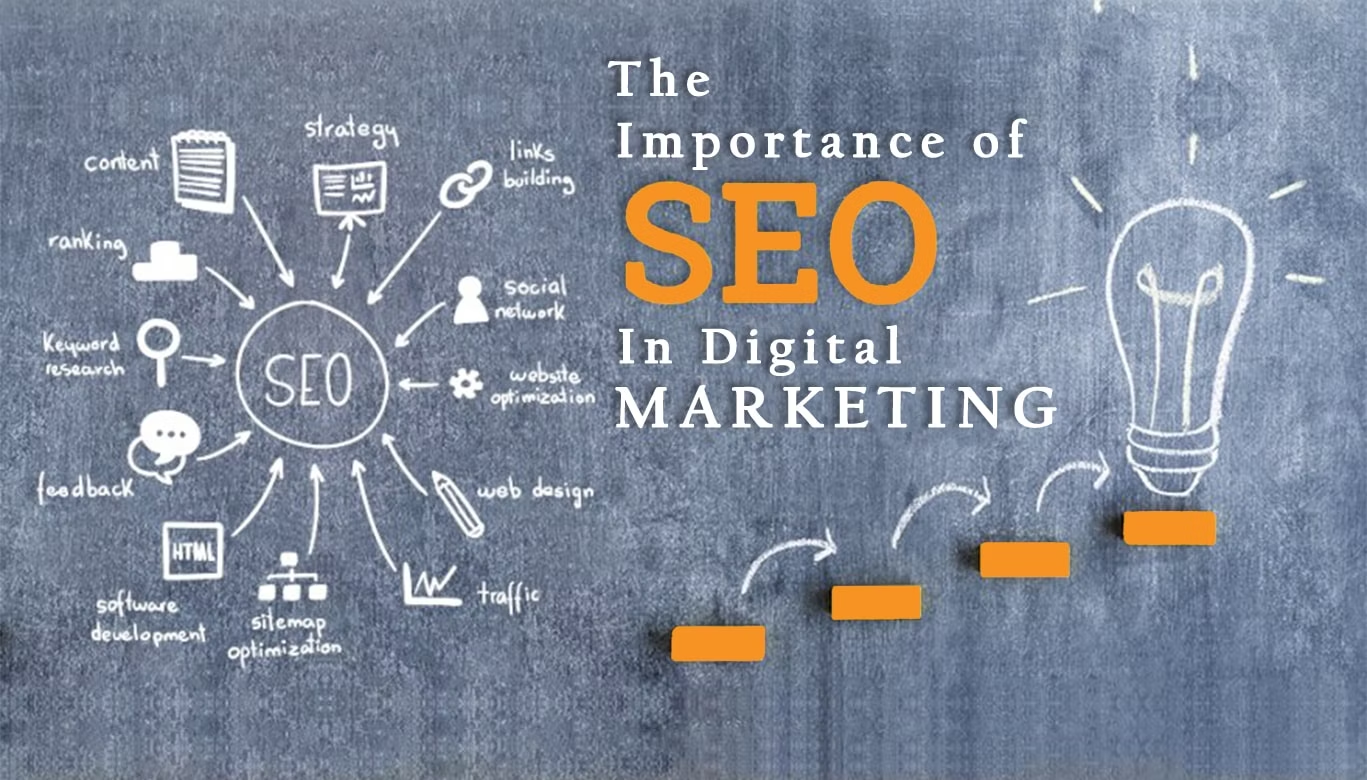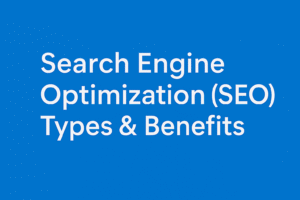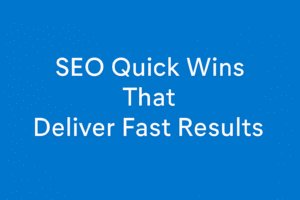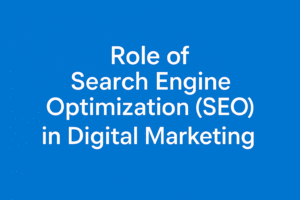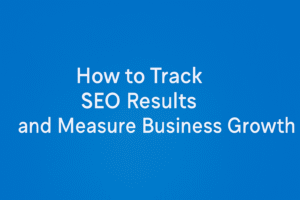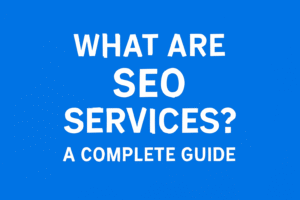What Is SEO?
Search Engine Optimization (SEO) is a digital marketing strategy designed to strengthen your website’s visibility in search results on platforms like Google, Bing, and Yahoo. It is about more than just ranking higher. It is about making sure your site clearly communicates its value to both search engines and the people using them.
Through a combination of techniques such as refining your content, improving your site’s structure, and enhancing its credibility, SEO helps search engines understand what your site is about and helps users quickly see why it is relevant to their needs.
In digital marketing, SEO serves as the bridge between your brand and your audience’s search intent. When implemented effectively, it ensures that when someone searches for products, services, or information you offer, your business appears right where they are looking. Unlike paid ads that stop the moment your budget does, strong SEO can generate consistent, organic traffic for the long haul.
How Does SEO Work?
When you implement an SEO strategy, you optimize your website so it appears in search engine results pages (SERPs) for keywords and phrases that are relevant to your business. The process starts with keyword research, using tools like Google Keyword Planner or Semrush etc. to find both primary and related keywords your audience is actually searching for.
Once you know your target terms, you’ll strategically use them in your site’s content, titles, headings, and meta descriptions so search engines understand the topic and relevance of each page. You can also submit your website’s URLs to Google Search Console (and other search engines) to make sure they are being crawled and indexed correctly.
But SEO is not just about keywords. It’s also about creating a better user experience (UX). That means designing pages that load quickly, work well on mobile devices, and guide visitors smoothly toward the information or products they want. Successful SEO satisfies the searcher’s intent, so your content should answer their questions and solve their problems in a clear, helpful way.
Over time, these improvements send positive signals to search engines that your site delivers real value to users. In response, your rankings in the SERPs can improve, giving you more opportunities to attract traffic, generate leads, and increase sales.
It’s important to remember that SEO is an ongoing process, not a one-time task. Search engines update their algorithms regularly, competitors publish new content, and audience behavior changes. To stay competitive, you need to consistently add fresh, relevant content, perform technical audits, and adapt to new best practices. Sustained effort is the key to achieving and maintaining strong search visibility.
How Do Search Engines Work?
To understand SEO, you first need to know how search engines operate. Search engines like Google, Bing, and Yahoo are massive information-sorting systems. Their job is to scan billions of web pages, organize that information, and deliver the most relevant results for each search query.
This process happens in three main steps: crawling, indexing, and ranking.
Step 1: Crawling
Search engines send out automated programs, often called “bots” or “spiders,” to discover new and updated web pages. These bots travel from link to link, scanning page content, headings, images, and other elements. If your pages are not linked properly or blocked from crawlers, search engines may never find them.
Step 2: Indexing
Once a page is discovered, the search engine analyzes its content and stores it in a giant database called the index. This index contains information about the text, images, videos, and metadata on the page. When a user searches for something, the search engine pulls matching results from this index—not directly from the live web.
Step 3: Ranking
From the indexed pages, algorithms determine which results are the most relevant, trustworthy, and useful for the searcher’s intent. Ranking is influenced by many factors, including keyword relevance, site quality, backlinks, mobile-friendliness, and page speed.
The Anatomy of a Search Results Page (SERP)
A typical SERP contains several elements:
- Paid results: Ads purchased through platforms like Google Ads, marked with a “Sponsored” or “Ad” label. Advertisers pay each time someone clicks these links.
- Organic results: Unpaid listings chosen by the search engine based on relevance and quality. This is where SEO efforts are focused.
- Additional features: Depending on the query, you might see Featured Snippets, “People Also Ask” (PAA) boxes, image packs, videos, or local map results (the “local 3-pack”).
If your website ranks well organically, it may appear at the top of the results page or even in special features like Featured Snippets or the local 3-pack, giving you prime visibility without paying for ads.
Organic vs. Paid Search
- Organic search: Free, earned placement in search results through SEO efforts.
- Paid search: Placement achieved through paid advertising campaigns, where you’re charged per click.
SEO focuses on improving your position in organic results because it can drive consistent, long-term traffic without ongoing ad spend. In fact, research shows that organic search can deliver significantly more traffic than social media, making it one of the most valuable digital marketing channels.
What Are the Benefits of SEO in Digital Marketing?
Search Engine Optimization is more than just a marketing tactic—it’s a growth engine for your business. By improving how your website appears in search results, SEO helps you attract more of the right visitors and turn them into customers. In fact, studies show that SEO leads have an average close rate of 14.6%, making it one of the most effective channels for generating qualified business opportunities.
Here are some of the most important benefits of SEO in digital marketing:
1. Boost Online Visibility and Brand Awareness
When your site appears near the top of search results, more people in your target audience discover your brand. This increased visibility not only drives more clicks but also helps establish your business as a known presence in your industry.
2. Increase Website Traffic
Higher rankings typically lead to more organic clicks. The more traffic you attract, the more opportunities you have to showcase your products, share your expertise, and convert visitors into paying customers.
3. Outperform Your Competitors
An effective SEO strategy allows you to outrank competitors for valuable keywords. This means when potential customers search for solutions in your niche, they see your business first—not your competitors’.
4. Build Credibility and Trust
Appearing on the first page of Google signals to users that your site is credible and relevant. Considering that over 90% of searchers never go beyond page one, ranking high instantly boosts your authority in the eyes of potential customers.
5. Drive Long-Term ROI
Unlike paid ads that disappear when you stop funding them, SEO can deliver results for months or even years after the initial work is done. Consistent optimization keeps your business visible, relevant, and competitive without the constant costs of advertising.

What Are the Types of SEO?
Before you can successfully implement an SEO strategy, it’s important to understand the main types of SEO in digital marketing—often referred to as the core pillars of SEO. Each type focuses on a different aspect of optimizing your website and overall online presence.
The primary types of SEO include:
- On-page SEO
- Off-page SEO
- Technical SEO
- Local SEO
- Specialized SEO
1. On-page SEO
On-page SEO involves the improvements you make directly on your website to boost its search visibility. The goal is to create a site that’s both user-friendly and informative, giving visitors clear answers and helpful solutions to their questions.
By refining on-page elements, you not only make your content more appealing to users but also help search engines understand your pages better. Many businesses choose to work with experts who specialize in SEO services in Dubai or SEO in Ajman to ensure their on-page elements are fully optimized for maximum impact. This alignment between user needs and search engine requirements can improve your rankings and increase the likelihood of clicks.
Key areas to optimize with on-page SEO include:
- Keywords – Naturally incorporate relevant terms that match your audience’s search intent.
- URLs – Keep them short, descriptive, and keyword-friendly.
- Title tags – Write clear, compelling titles that reflect the page’s topic.
- Header tags (H1, H2, H3) – Organize content for readability and context.
- Meta descriptions – Summarize page content in a way that entices clicks.
For example, a well-crafted title tag can signal the topic to search engines and attract user attention in the SERPs, increasing both visibility and click-through rates.
Off-page SEO
Off-page SEO focuses on activities that happen outside of your website but still influence your rankings. The main goal is to build your site’s authority and credibility in the eyes of both search engines and users. While domain authority itself isn’t a direct Google ranking factor, a strong reputation supported by high-quality references can significantly improve your position in search results.
This type of SEO is largely about earning trust signals—links, shares, and mentions—that show your site offers valuable, reliable content worth recommending. Businesses often work with professional agencies, such as those offering SEO services Abu Dhabi, to develop strong off-page strategies that include outreach, content promotion, and link-building.
Key off-page SEO activities include:
- Publishing high-quality, valuable content that others want to reference.
- Promoting your content on social media to increase visibility and engagement.
- Collaborating with influencers to reach new audiences and build credibility.
- Guest posting or contributing content to reputable websites in your industry.
When other sites link to yours or when your content is widely shared, it sends positive signals to search engines that your brand is a trusted resource. Over time, a strong off-page SEO strategy can elevate both your search rankings and your online reputation.
3. Technical SEO
Technical SEO focuses on the behind-the-scenes improvements that make your website easy for both search engine crawlers and human visitors to navigate and understand. Crawlers scan your pages, collect information, and store it in search engine databases so your site can appear in relevant results later.
By fine-tuning the technical aspects of your site, you can ensure it loads quickly, is easy to navigate, and is accessible across all devices.
Core elements of technical SEO include:
- Page load speed – Fast-loading pages improve both user satisfaction and rankings.
- Navigation – Clear menus and logical site structure help users and crawlers find content.
- Image optimization – Proper file sizes, formats, and alt text improve accessibility and load times.
- Mobile-first indexing – Designing with mobile users in mind, as over 60% of Google searches now happen on mobile devices.
A strong technical foundation not only helps search engines index your pages more effectively but also ensures your visitors can find what they need quickly, leading to better engagement and higher rankings in the SERPs.
4. Local SEO
Local SEO focuses on optimizing your online presence so your business appears in location-specific search results. This strategy is especially important for small businesses, service providers, and any company that serves a defined geographic area. By targeting local searches, you can attract customers who are actively looking for products or services near them.
Common local SEO tactics include:
- Setting up and optimizing your Google Business Profile.
- Collecting and responding to local customer reviews.
- Optimizing your site for “near me” and location-based search queries.
- Creating location-specific content that speaks directly to your community.
A strong local SEO strategy increases your visibility for nearby searchers, drives foot traffic or local inquiries, and helps you compete effectively in your region.
How Does SEO in Digital Marketing Compare to SEM and PPC?
When exploring search marketing strategies, you’ll often hear terms like SEO, SEM, and PPC. While they all aim to improve visibility on platforms like Google, they do so in different ways.
SEO vs. SEM
SEO (Search Engine Optimization) is about improving your rankings in organic (non-paid) search results. Whether you’re targeting a global audience or focusing on specific regions such as SEO in Ras Al Khaimah, the core goal is the same—optimize your site so it appears naturally in search results when people look for relevant products or services.
SEM (Search Engine Marketing) is a broader approach that covers both organic SEO and paid advertising. For example, a business might improve its organic rankings while also investing in targeted ads for key markets. This is common for companies that want faster visibility in competitive areas, such as businesses seeking SEO services in Al Ain while also running paid campaigns.
SEO vs. PPC
PPC (Pay-Per-Click) advertising is a paid search strategy where you bid on keywords so your ads show at the top of the SERPs. You pay each time someone clicks on the ad. It’s a great way to achieve instant visibility for product launches, seasonal promotions, or entering new markets—but the traffic stops when the budget does.
SEO, by comparison, focuses on sustainable, long-term growth. It may take time to see results, but once you achieve strong rankings, you can keep attracting organic traffic without ongoing ad spend.
Which Should You Choose?
For most businesses, the most effective approach is a blend of SEO and SEM. SEO lays the foundation for long-term traffic and credibility, while PPC delivers quick wins when you need immediate results.
- Choose PPC (as part of SEM) if you need instant exposure, want to dominate a competitive niche, or are targeting time-sensitive offers.
- Choose SEO if you want lasting visibility, stronger website quality, and a cost-effective growth path.

Common SEO Myths
SEO is an ever-evolving field, but it’s also surrounded by misconceptions that can lead businesses astray. Here are some of the most common myths to watch out for:
Link building is outdated.
While link-building tactics have evolved, earning high-quality backlinks from reputable sources is still one of the strongest signals of credibility and authority in search algorithms.
SEO is a one-time task.
Many believe that once a website is optimized, the work is done. In reality, SEO requires ongoing updates to content, technical elements, and keyword targeting to maintain and improve rankings.
Local SEO isn’t important if you have a website.
Even businesses with strong online visibility can miss opportunities if they ignore Local SEO. Optimizing for location-specific searches ensures customers in your area can find you—whether you’re targeting a small town or a larger market like SEO services in Sharjah.
More keywords mean better rankings.
Stuffing a page with keywords can harm user experience and even trigger search engine penalties. Quality, relevance, and natural usage matter far more than keyword quantity.
How Infinitra Web Can Help with SEO
Choosing the right partner for your SEO strategy can make all the difference in achieving sustainable online growth. Infinitra Web is a full-service digital marketing agency specializing in creating tailored SEO solutions that help businesses stand out in competitive markets.
With expertise spanning on-page, off-page, technical, and local SEO, Infinitra Web develops strategies based on your unique goals, industry, and target audience. Whether you need to boost your search rankings, improve your website’s user experience, or capture more local customers, their team has the tools and experience to deliver measurable results.
What Infinitra Web offers:
- Comprehensive SEO audits to identify opportunities and technical issues.
- Strategic keyword research to target the terms your audience is searching for.
- High-quality content creation designed to attract, engage, and convert.
- Local SEO optimization to improve visibility for “near me” and location-based searches.
- Ongoing performance tracking to refine campaigns and maximize ROI.
Infinitra Web proudly serves clients across the UAE, including Dubai, Sharjah, Abu Dhabi, Al Ain, and Ras Al Khaimah. By combining data-driven insights with creative strategies, they help businesses not only climb the search rankings but also build lasting credibility and trust online. From small startups to established brands, they provide the guidance and execution needed to turn search visibility into real-world growth.

